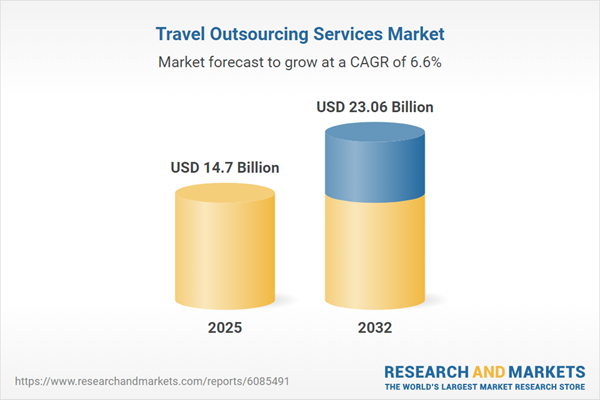Speak directly to the analyst to clarify any post sales queries you may have.
The travel outsourcing services market is undergoing rapid transformation, fueled by digital innovation, evolving regulatory frameworks, and the imperative for streamlined, resilient operations. Senior decision-makers recognize outsourcing as a critical strategy that now shapes every aspect of corporate travel management, from process efficiency to risk mitigation.
Market Snapshot: Growth Trends in the Travel Outsourcing Services Market
The Travel Outsourcing Services Market grew from USD 13.85 billion in 2024 to USD 14.70 billion in 2025. Sustained by a compound annual growth rate (CAGR) of 6.57%, it is projected to reach USD 23.06 billion by 2032. This growth reflects rising demand for integrated, digitally enabled outsourcing solutions in travel and hospitality as organizations seek greater operational agility, cost optimization, and capability maturity. The market is responding to complex global dynamics, changing traveler expectations, and technology-led convergence, positioning itself as an essential enabler for today’s enterprise strategies.
Scope & Segmentation: Insights Across Key Segments and Regions
- Service Types: Back-office outsourcing (including accounting, finance, claims processing, data entry and processing), business process outsourcing services (such as booking and ticketing, call center support, customer support, reservation services), content and translation services, IT outsourcing services, and sales and marketing outsourcing.
- Travel Types: Business travel outsourcing, group travel outsourcing, leisure travel outsourcing, and medical travel.
- Technology Types: Artificial intelligence (AI), big data and analytics, blockchain, cloud-based services, and Internet of Things (IoT).
- Contract Duration: Long-term contracts, project-based outsourcing, and short-term contracts each support different business priorities and risk management styles.
- Enterprise Size: Solutions are tailored for large enterprises and small and medium enterprises (SMEs), addressing unique scalability and resource requirements.
- Industry Types: Airlines, corporate travel, hospitality, rail and transport, tourism and leisure stakeholders.
- Geographic Coverage: Americas (North America, Latin America), Europe, Middle East & Africa, Asia-Pacific, with focus areas including the United States, Canada, Brazil, United Kingdom, Germany, China, India, and others.
- Leading Companies: Amadeus IT Group, ARDEM Incorporated, BCD Travel, Acquire BPO Pty Ltd, ATPI Limited, ContactPoint360, Corporate Travel Management, CWT Global B.V., Eminenture, FCM Travel Solutions, GBT Travel Services UK Limited, Gear Inc., HashStudioz Technologies, Helpware Inc., IBN Technologies Ltd., Invensis Technologies Pvt Ltd, iScale Solutions, Magellan Solutions, MaxTech Data House, Nubook Private, OfficePartners360, Peak Support, Sigma Connected Ltd., SkyBook Global, TELUS Communications Inc., The Nest by Concentrix, and Unity Communications.
Key Takeaways for Travel Outsourcing Decision-Makers
- Outsourcing in travel extends far beyond process delegation, now demanding robust digital skills, governance, and regulatory compliance.
- Shifts in global operating models and vendor relationships are driven by hybrid work patterns and a heightened focus on traveler safety, risk management, and sustainability.
- Advanced technologies—including machine learning, smart contracts, and immersive analytics—are reshaping procurement, personalizing customer experience, and unlocking new service efficiencies.
- Regional variations require flexible, localized strategies; navigating compliance in EMEA, leveraging nearshore capabilities in the Americas, and exploiting digital ecosystems across Asia-Pacific are crucial for competitiveness.
- Key industry players stand out by merging domain expertise, proprietary technology, and clear commitments to sustainability and inclusion—factors increasingly important in vendor selection.
Tariff Impact: Operational Shifts and Strategic Adaptation
Recent United States tariffs have significantly impacted travel outsourcing supply chains, particularly for digital infrastructure components and hardware. These changes necessitate new procurement strategies—including reshoring select components, diversifying suppliers, and heavier investment in cloud platforms—to maintain service continuity and manage cost pressures. Automation across back-office and customer service is gaining traction to preserve productivity and flexibility, while real-time cost analytics empower organizations to adapt sourcing swiftly in response to evolving trade conditions.
Methodology & Data Sources: Ensuring Market Insight Accuracy
This report’s insights are derived from thorough primary and secondary research, including executive interviews at travel agencies, corporate departments, and outsourcing firms. Industry publications, regulatory filings, and data from established analytics platforms support quantitative validation and depth. Rigorous scenario analysis ensures findings reflect dynamic market, regulatory, and technology conditions relevant to senior leadership.
Why This Report Matters
- Enables senior leaders to benchmark strategies, technological adoption, and supplier selection models against market realities and best practices.
- Delivers actionable analysis of regional variations, segment-specific priorities, and operational tactics to maximize resilience and performance in a changing global landscape.
- Guides sourcing and innovation strategies by anticipating technology trends, regulatory shifts, and evolving enterprise needs.
Conclusion
The travel outsourcing services sector is navigating a period of accelerated change where integration of advanced technologies, compliance excellence, and adaptive sourcing models set future leaders apart. Informed decision-making will be fundamental to building operational advantage as market forces continue to evolve.
Table of Contents
3. Executive Summary
4. Market Overview
7. Cumulative Impact of Artificial Intelligence 2025
Companies Mentioned
The companies profiled in this Travel Outsourcing Services Market report include:- Amadeus IT Group
- ARDEM Incorporated
- BCD Travel
- Acquire BPO Pty Ltd
- ATPI Limited
- ContactPoint360
- Corporate Travel Management
- CWT Global B.V.
- Eminenture
- FCM Travel Solutions
- GBT Travel Services UK Limited
- Gear Inc.
- HashStudioz Technologies
- Helpware Inc.
- IBN Technologies Ltd.
- Invensis Technologies Pvt Ltd
- iScale Solutions
- Magellan Solutions, Inc.
- MaxTech Data House Private Limited
- Nubook Private Limited
- OfficePartners360 LLC
- Peak Support
- Sigma Connected Ltd.
- SkyBook Global
- TELUS Communications Inc.
- The Nest by Concentrix
- Unity Communications
Table Information
| Report Attribute | Details |
|---|---|
| No. of Pages | 180 |
| Published | November 2025 |
| Forecast Period | 2025 - 2032 |
| Estimated Market Value ( USD | $ 14.7 Billion |
| Forecasted Market Value ( USD | $ 23.06 Billion |
| Compound Annual Growth Rate | 6.5% |
| Regions Covered | Global |
| No. of Companies Mentioned | 28 |









